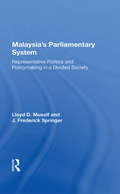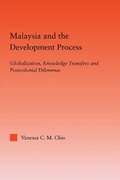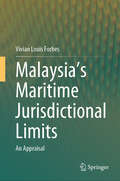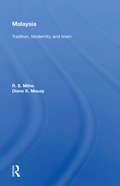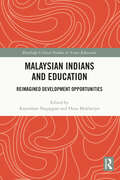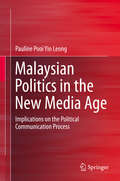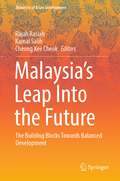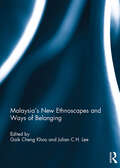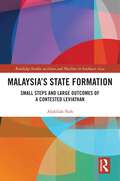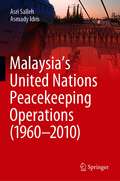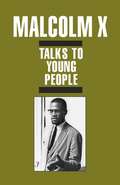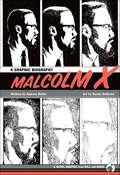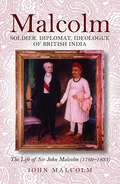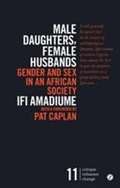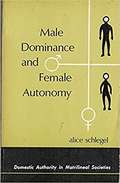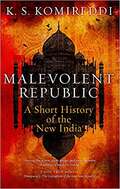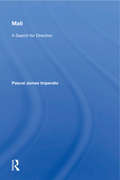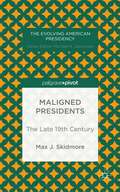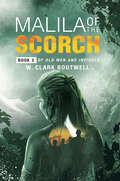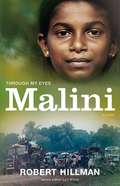- Table View
- List View
Malayasia's Parliamentary System: Representative Politics And Policymaking In A Divided Society
by Lloyd D MusolfMalaysia, a new nation whose very existence depends on holding disparate ethnic groups in balance, is an example of a developing nation whose legislature does influence policy. This pioneering survey and analysis of the Malaysian parliament carefully documents and interprets the interaction of legislator, party, and voter in Malaysia. The study ind
Malaysia and the Development Process: Globalization, Knowledge Transfers and Postcolonial Dilemmas (Studies in International Relations)
by Vanessa C.M. ChioDrawing on recent deconstructions in anthropology, postcolonial studies, and critical sociology, Malaysia and the Development Process situates and explores the phenomenon of international knowledge transfers within the context of globalization. Based on primary and secondary research, and a series of 'experiential' reflections, fieldwork was conducted in two foreign electronics multinationals and a variety of public and semi-public institutions. The findings reassess issues of knowledge, power, subjectivity and agency, and the relations between the West and the non-West, as they are negotiated between and within multinational workplaces and local agencies in Malaysia.
Malaysia's Maritime Jurisdictional Limits: An Appraisal
by Vivian Louis ForbesThe book adopts an interdisciplinary approach to maritime boundary delimitation and uses Malaysia as a case study. The country may be considered 'zone-locked' in the context of the Law of the Sea.Administrators, political scientists, academic researchers and university students will benefit from the contents of this book. Apart from its well written narrative, perhaps the most important aspect of the work most perhaps series of beautifully drawn maps and diagrams accompanied by detailed captions or commentaries, a unique collection worthy of publication on its own.
Malaysia: Tradition, Modernity, And Islam
by R. S. MilneMalaysia has many problems in common with other developing countries—including the difficult task of achieving economic progress and modernization while retaining useful traditional values, reducing poverty, and minimizing dependence on the export of a few primary products. It also has a remarkable, if not unique, diversity of cultures. Its ethnic divisions (approximately 47 percent Malay 34 percent Chinese, 9 percent Indian, and 10 percent "other") are deep, reflecting differences in race, language, culture, and religion. At present, the main danger of serious ethnic tension arises from the impact of the Islamic resurgence. The Malays, who are dominant politically, are Muslims, but very few Chinese, the second largest ethnic group, are Muslims. It is especially remarkable, given this ethnic mix, that Malaya (which became Malaysia in 1963) achieved independence peacefully (in 1957), has experienced no military coups or takeovers, and has regularly held elections. This book examines Malaysia's history, population, social structure, politics, and economics as well as its climate, agriculture, and wildlife and seeks to explain why, despite its inherent ethnic tensions, Malaysia has survived and even prospered.
Malaysian Indians and Education: Reimagined Development Opportunities (Routledge Critical Studies in Asian Education)
by Rajendran Nagappan Hena MukherjeeThis edited volume provides a comprehensive overview and discussion of the issues surrounding the Malaysian Indian community’s educational development. Malaysian Indian citizens who make up seven per cent of the population have their own set of strengths and weaknesses, while facing deep-seated socio-economic challenges. Education is seen as an enabler which could significantly facilitate social and economic upward mobility, as shown in policies and practices implemented under the New Economic Policy, many of which have unfortunately bypassed the Indian Community. This book explores and assesses the various aspects of the education endeavour of Malaysian Indians, including primary, secondary, post-secondary and tertiary education. Related challenges include urban poverty, school dropouts, dysfunctional families and other socio-economic issues. It reconsiders educational equity policies and practices in place while proposing new initiatives which could support and chart a way forward for the development of Malaysian Indians. Importantly, the publication addresses the roles of the government, private sector and civil society to help elevate the educational achievements of the Indian Community. The book will appeal to students and academics in the faculties of social science and comparative education, development economics and sociology, with a focus on access and equity in education. Proposals for change would be of interest to policy-makers and managers of educational and non-governmental organisations in plural societies.
Malaysian Politics in the New Media Age: Implications on the Political Communication Process
by Pauline Pooi Yin LeongThis book provides a comprehensive overview of the impact of the Internet on Malaysian politics and how it has played a pivotal role in influencing the country’s political climate. It lays out the background of Malaysia’s political history and media environment, and addresses the ramifications of media-isation for the political process, including political public relations, advertising and online campaigns. The book examines the Internet’s transformative role and effect on Malaysian democracy, as well as its consequences for political actors and the citizenry, such as the development of cyber-warfare, and the rise of propaganda or “fake” news in the online domain. It also investigates the interplay between traditional and new media with regard to the evolution of politics in Malaysia, especially as a watchdog on accountability and transparency, and contributes to the current discourse on the climate of Malaysian politics following the rise of new media in the country. This book is particularly timely in the wake of the 2018 Malaysian general election, and will be of interest to students and researchers in communications, politics, new media and cultural studies.
Malaysia’s Leap Into the Future: The Building Blocks Towards Balanced Development (Dynamics of Asian Development)
by Rajah Rasiah Kamal Salih Cheong Kee CheokThis book presents the future development of Malaysia. It puts together building blocks to achieve a better future. These blocks are poverty and income inequality, population, demography and urbanization, growth and technological progress, education, human capital and skills, finance, labor, the environment, and health care. It examines the reasons for the decline in the agricultural sector with an emphasis on food security. It discusses Malaysia’s economic growth and structural change compared to some of the Northeast East Asian and Southeast Asian countries. It explains the projections of population and demographic change and its bearing on government policies. It evaluates the country’s education sector and discusses the strategies to improve its role in the country further. It argues for replacing ethnic-based approaches with a needs-based system for the future direction to build a plural Malaysia. This insightful book is of interest across several fields, including demography, economic development, and urbanization.
Malaysia’s New Ethnoscapes and Ways of Belonging
by Gaik Cheng Khoo and Julian C.H. LeeThis book provides a picture of a globalized Malaysia where its conventionally-conceived multi-ethnic composition of Malays, Chinese, Indians and Others rub shoulders with or interact more intimately on a daily basis with transnational ethnoscapes of migrant workers, asylum seekers, international students, and foreign spouses. It asks how, as Malaysians become wedded to their citizenship, they extend the same awareness of rights and claims to non-citizens such as African international students, the Indonesian maids who look after their children, and the Chins and stateless Rohingyas who populate the landscape as refugees and undocumented workers. What are the possibilities of forming cosmopolitan solidarities with non-Malaysians? And what are the newcomers’ strategies for place-making and belonging? And to bring the discussions of citizenship in Malaysia into relief, it is also asked how Malaysians abroad seek to enact and make meaningful their Malaysian citizenship. A diversity of experiences shapes the narratives in the chapters: of racialization, rejection, boundary-making and exclusivity, resilience and adaptation.This book was published as a special issue of Citizenship Studies.
Malaysia’s State Formation: Small Steps and Large Outcomes of a Contested Leviathan (Routledge Studies on Islam and Muslims in Southeast Asia)
by Abdillah NohTracing Malaysia’s political economy since 1800, Abdillah Noh argues that it has been substantially path-dependant based on choices made by the British colonial administration. Focusing mainly on two major groupings in Malaysia’s political economy – the Malays and Chinese Malaysians – Noh demonstrates that British policies engendered two processes. First, a less-than-full-retrenchment of Malay political dominance by preserving Malay de jure power and, second a less-than-full incorporation of new actors in Malaya’s political economy. Such decisions to preserve Malay de jure power alongside half-hearted measures at incorporating non-Malays’ economic and political presence created communities with mutually exclusive institutions that increasingly compete for access to political, social and economic resources. He thus reasons that Malaysia’s state formation - and the consequent consociational logic - is not a contrived act that was hatched at the point of its independence. Rather, it is the result of deep institutional processes that are centred on the idea of path dependence, self- reinforcement mechanism, timing and sequence. A valuable read for scholars of Malaysian history and politics, as well as for scholars of postcolonial state formation and public policy more broadly.
Malaysia’s United Nations Peacekeeping Operations (1960–2010)
by Asri Salleh Asmady IdrisSmall and developing states make up the majority of participants in United Nations Peacekeeping Operations (UNPKO), and Malaysia is one of these. The numerous previous studies on Malaysia’s UNPKO are primarily historical narratives which focus on practical, policy-related issues and due process, making no attempt to synchronize the nexus between theory and policy analysis. Nor do they cover the theoretical aspect which can operationalize and address the question of the roles played by Malaysia’s domestic actors (foreign policy executives, legislature, military, media, public opinion) in the respective decision-making processes as well as those of external level, such as international power politics and geopolitical considerations. In other words, they are predominantly a historical narrative of only several Malaysia’s UNPKO.This book fills the critical gap. It deliberates on the respective national and international decision-making processes, especially from the Malaysian point of view, and analyses the theoretical and practical impacts of Malaysia’s UNPKO in understanding international politics. Apart from providing a well-researched account of Malaysia’s UNPKO across the globe for 50 years, i.e. 1960-2010, this book examines the determinants by using qualitative data, particularly key-informant interviews and documentary analysis. Thus, while most studies of Malaysia’s UNPKO single out domestic imperatives as the most vital determinant, this book, on the contrary, comprehensively identifies the prevailing world security order as the most important determinant influencing Malaysia’s UNPKO, followed by the domestic ones.
Malcolm X Talks to Young People (pamphlet)
by Malcolm XA selection of speeches from the book of the same title. Includes Malcolm's 1965 interview with the Young Socialist magazine.
Malcolm X: A Graphic Biography
by Andrew HelferThe age of multitasking needs better narrative history. It must be absolutely factual, immediately accessible, smart, and brilliantly fun. Enter Andrew Helfer, the award-winning graphic-novel editor behind Roadto Perdition and The History of Violence, and welcome the launch of a unique line of graphic biographies.If a picture is worth a thousand words, these graphic biographies qualify as tomes. But if you're among the millions who haven't time for another doorstop of a biography, these books are for you.With the thoroughly researched and passionately drawn Malcolm X, Helfer and award-winning artist Randy DuBurke capture Malcolm Little's extraordinary transformation from a black youth beaten down by Jim Crow America into Malcolm X, the charismatic, controversial, and doomed national spokesman for the Nation of Islam.
Malcolm: The Life of Sir John Malcolm (1769–1833)
by John MalcomThis biography chronicles the life of the East India Company administrator from his humble origins to his career as a leader of British Imperialism. As a soldier, statesman, and historian, Sir John Malcolm played a major part in transforming the East India Company from a commercial enterprise into an agent of imperial government. Born in 1769, Malcolm was one of seventeen children of a tenant farmer in the Scottish Borders. He was only thirteen years old when he left home to join the Madras Army in British India. Over the following half-century, Malcolm distinguished himself first as a soldier fighting alongside the future Duke of Wellington, then as an administrator in Central India where he became Governor of Bombay. Malcolm led three East India Company missions to Persia in the early stages of diplomatic rivalry between Britain and Russia. He wrote nine books on the history and culture of the region, including his highly influential History of Persia. Based on extensive research in Britain, India and Iran, this biography brings to life the story of a man who helped shape a significant era of imperial history.
Male Daughters, Female Husbands: Gender and Sex in an African Society
by Ifi AmadiumeIn 1987, more than a decade before the dawn of queer theory, Ifi Amadiume wrote Male Daughters, Female Husbands, to critical acclaim. This compelling and highly original book frees the subject position of 'husband' from its affiliation with men, and goes on to do the same for other masculine attributes, dislocating sex, gender and sexual orientation. <P><P>Boldly arguing that the notion of gender, as constructed in Western feminist discourse, did not exist in Africa before the colonial imposition of a dichotomous understanding of sexual difference, Male Daughters, Female Husbands examines the structures in African society that enabled people to achieve power, showing that roles were not rigidly masculinized nor feminized. At a time when gender and queer theory are viewed by some as being stuck in an identity-politics rut, this outstanding study not only warns against the danger of projecting a very specific, Western notion of difference onto other cultures, but calls us to question the very concept of gender itself.
Male Dominance And Female Autonomy: Domestic Authority In Matrilineal Societies (Comparative Studies)
by Alice Schlegel Raoul NarollMale Dominance and Female Autonomy: Domestic Authority in Matrilineal Societies
Maleficent
by Elizabeth Rudnick Scott A. Piehl Disney Book Group Staff Elizabeth HesslerA deluxe novelization of the Walt Disney Studios film Maleficent, starring Angelina Jolie. This visually dazzling live action film explores the origins of one of the most iconic Disney villains: Maleficent, the infamous fairy who curses Princess Aurora in Disney's animated classic Sleeping Beauty. This "origin" story is told from Maleficent's perspective, intersecting with the classic in both familiar and unexpected ways. The movie stars Academy Award-winning actress Angelina Jolie as Maleficent, and is directed by two-time Oscar-winning production designer Robert Stromberg (Avatar, Alice in Wonderland). The film co-stars Elle Fanning (Super 8) as the Princess Aurora, and features Sharlto Copley (District 9), Imelda Staunton (Harry Potter and the Order of the Phoenix), and Juno Temple (Atonement).
Malevolent Republic: A Short History Of The New India
by K. S. KomireddiAfter decades of imperfect secularism, presided over by an often corrupt Congress establishment, Nehru's diverse republic has yielded to Hindu nationalism. India is collapsing under the weight of its own contradictions. Since 2014, the ruling BJP has unleashed forces that are irreversibly transforming the country. Indian democracy, honed over decades, is now the chief enabler of Hindu extremism. Bigotry has been ennobled as a healthy form of self-assertion, and anti-Muslim vitriol has deluged the mainstream, with religious minorities living in terror of a vengeful majority. Congress now mimics Modi; other parties pray for a miracle. In this blistering critique of India from Indira Gandhi to the present, Komireddi lays bare the cowardly concessions to the Hindu right, convenient distortions of India's past and demeaning bribes to minorities that led to Modi's decisive electoral victory. If secularists fail to reclaim the republic from Hindu nationalists, Komireddi argues, India will become Pakistan by another name.
Mali's Next Battle: Improving Counterterrorism Capabilities
by Stephanie Pezard Michael Shurkin S. Rebecca ZimmermanThis report examines Mali’s counterterrorism requirements in light of recent evolutions in the country’s security environment: The terrorist threat in Mali is growing, but Mali’s military remains largely ineffective. It is not possible to strengthen Mali’s counterterrorism capabilities in isolation from its general military capabilities, which are in need of fundamental reform.
Mali: A Search For Direction (Historical Dictionaries Of Africa Ser. #107)
by Pascal James ImperatoThis book, based on twenty-three years of research, field work, and contacts with both Malians and non-Malians familiar with Mali, provides an overview of its history, economic development, culture and society. It is intended for general readers and specialists who are interested to know about Mali.
Mali: Poverty Reduction Strategy Paper
by International Monetary FundA report from the International Monetary Fund.
Malice in Wonderland: My Adventures in the World of Cecil Beaton
by Hugo VickersThe witty and perceptive diaries kept by Cecil Beaton's authorized biographer during his many fascinating encounters with extraordinary—often legendary—characters in his search for the real Cecil Beaton.Hugo Vickers's life took a dramatic turn in 1979 when the legendary Sir Cecil Beaton invited him to be his authorised biographer. The excitement of working with the famous photographer was dashed only days later when Cecil Beaton died. But the journey had begun - Vickers was entrusted with Beaton's papers, diaries and, most importantly, access to his friends and contemporaries. In Malice in Wonderland, Vickers shares excerpts from his personal diaries kept during this period. For five years, Vickers travelled the world and talked to some of the most fascinating and important social and cultural figures of the time, including royalty such as the Queen Mother and Princess Margaret, film stars such as Grace Kelly, Audrey Hepburn and Julie Andrews, writers such as Truman Capote, and photographers such as Irving Penn and Horst. And not only Beaton's friends - Vickers sought out the enemies too, notably Irene Selznick. He was taken under the wings of Lady Diana Cooper, Clarissa Avon and Diana Vreeland. Drawn into Beaton's world and accepted by its members, Vickers the emerging biographer also began his own personal adventure. The outsider became the insider - Beaton's friends became his friends. Malice in Wonderland is a fascinating portrait of a now disappeared world, and vividly and sensitively portrays some of its most fascinating characters as we travel with Vickers on his quest.
Maligned Presidents: The Late 19th Century
by Max J. SkidmoreCertain 19th Century presidencies contrast common perceptions of the office's authority and strength. These presidents were a strong group and were anything but insignificant. They fought substantial battles with Congress, and often won. This book seeks to provide more substantive analysis of maligned presidencies, and the legacies left behind.
Malila Of The Scorch: Book 3 of Old Men and Infidels (Old Men and Infidels)
by W. Clark Boutwell2129 AD - The long-awaited war approaches. Young countries make one kind of mistake, while old countries make another.2129 AD - The long-awaited war approaches. Young countries make one kind of mistake, while old countries make another. For the Unity, the lone surviving high-tech and forward-thinking remnant of a once-vital America, war represents a final chance to liberate the backward and unfashionable Midlands from their centuries-long nightmare of freedom and self-determination. War breeds opportunity and danger. Young Malila Chiu, once a hero of the Unity, emerges from the jungle to deliver a dire message to a beleaguered America: the Deep Scorch, a polyarchy of sentient plants, declares itself to be a potent ally—or a dangerous foe. Familiar and distrustful of the Scorch for much of his long life, Jesse Johnstone stays by Malila&’s side for the sake of their love. The grand architect of the war, Unity General Eustace Jourdaine, recovering from grievous injuries, rallies to lead his troops into battle in the hopes of winning a new empire—but for whom? All the while, within the bowels of the Unity, American spies, William Butler, Hecate, and Elise, delve into the secrets of the CORE and their own mortality to thwart the invasion. Even as combat and betrayal swirl around him, the Old Man learns too late that this latest battle with the Unis may be his final one. Malila of the Scorch completes the Malila/Jesse Trilogy that started with Outland Exile and continued with Exiles&’ Escape.
Malini (Through My Eyes #5)
by Robert Hillman Lyn WhiteBut where will the next meal come from? Who can they trust? Where will they shelter? And will they ever be reunited with their parents again?.. The uplifting story of one girl's odyssey through war-torn Sri Lanka.
Malled
by Caitlin KellyOne woman's midcareer misadventures in the absurd world of American retail. After losing her job as a journalist and the security of a good salary, Caitlin Kelly was hard up for cash. When she saw that The North Face-an upscale outdoor clothing company-was hiring at her local mall, she went for an interview almost on a whim. Suddenly she found herself, middle-aged and mid-career, thrown headfirst into the bizarre alternate reality of the American mall: a world of low-wage workers selling overpriced goods to well-to-do customers. At first, Kelly found her part-time job fun and reaffirming, a way to maintain her sanity and sense of self-worth. But she describes how the unexpected physical pressures, the unreasonable dictates of a remote corporate bureaucracy, and the dead-end career path eventually took their toll. As she struggled through more than two years at the mall, despite surgeries, customer abuse, and corporate inanity, Kelly gained a deeper understanding of the plight of the retail worker. In the tradition of Nickel and Dimed, Malled challenges our assumptions about the world of retail, documenting one woman's struggle to find meaningful work in a broken system. .
